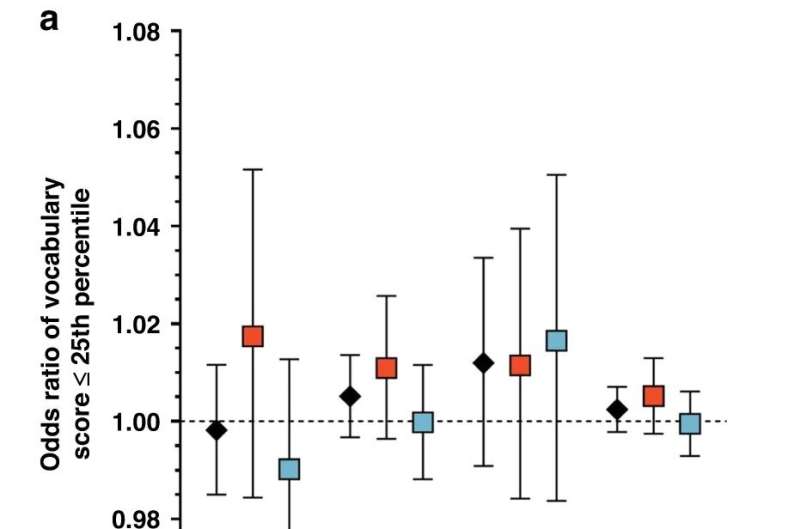This article has been reviewed according to Science X's editorial process and policies. Editors have highlighted the following attributes while ensuring the content's credibility:
fact-checked
trusted source
proofread
Higher acetaminophen intake in pregnancy linked to attention deficits in young children

A new study links increased use of acetaminophen during pregnancy—particularly in the second trimester—to modest but noticeable increases in problems with attention and behavior in 2-, 3- and 4-year-olds. The study adds to a growing body of evidence linking the frequent use of acetaminophen in pregnancy to developmental problems in offspring.
The findings are detailed in the journal Neurotoxicology and Teratology.
The research is part of the Illinois Kids Development Study at the University of Illinois Urbana-Champaign, which explores how environmental exposures influence child development. The study tracked hundreds of children, collecting data on their prenatal chemical exposures and asking caregivers to assess their behaviors and traits at ages 2, 3 and 4.
While acetaminophen is considered the safest painkiller and fever reducer available during pregnancy, previous studies have found evidence of a range of possible negative outcomes for children exposed to the drug in gestation, said Megan Woodbury, who led the research as a graduate student at the U. of I. with comparative biosciences professor emerita Susan Schantz, the principal investigator of the IKIDS program at Illinois.
Woodbury is now a postdoctoral researcher at Northeastern University in Boston. Schantz is a Beckman Institute for Advanced Science and Technology faculty member at the U. of I.
A recent study led by Woodbury and Schantz linked higher acetaminophen exposure in pregnancy to language delays in children.
Some previous studies have found no relationship between acetaminophen use in pregnancy and attention and behavior in childhood, while other, usually larger studies found relationships between more frequent use of the medication during pregnancy and attention-related and behavioral problems in offspring.
Most of the latter studies were conducted in older children and questioned pregnant participants about their use of acetaminophen at most once per trimester. The new study asked pregnant parents about their acetaminophen use six times over the course of the pregnancy—roughly once every four-to-six weeks—offering a more precise picture of the magnitude and timing of the drug exposures.
The researchers also asked caregivers to answer dozens of standardized questions about their child's behavior and ability to pay attention at ages 2, 3, and 4. More than 300 children were assessed at age 2, with 262 assessed again at 3 and 196 at age 4.
"Our most important finding was that with increasing acetaminophen use by pregnant participants, especially during the second trimester, their children showed more attention-related problems and ADHD-type behaviors, which we call 'externalizing behaviors,' at every age we measured," Woodbury said.
"The kinds of behaviors the caregivers reported included things like the child talking out of turn, not paying attention, not being quiet when they were supposed to be quiet, not sitting down when they were supposed to be sitting down, and being a little aggressive with other children," Schantz said.
The findings are not an indication that the children have attention-deficit/hyperactivity disorder or that they will be diagnosed with ADHD at a later date, Schantz said. However, the children seem to be having more trouble with attention than peers of the same age who were less exposed or not exposed to acetaminophen in the womb.
Woodbury, who herself is pregnant, says she does not want to scare others away from using acetaminophen in pregnancy when needed. Extreme headaches or other painful episodes and fevers can be debilitating and even dangerous, calling for the use of the drug. She said she has turned to acetaminophen once per trimester so far. But she also chooses not to use it for minor aches, pains, or slight fevers.
More research is needed to test whether more frequent use of acetaminophen during the second trimester of pregnancy may be particularly problematic for the developing brain, the researchers said. The study also is limited as participants were mostly white, non-Hispanic and of higher economic status. Schantz and her team are working to broaden the cohort of participants in IKIDS to include pregnant people from a greater diversity of social, economic, and racial backgrounds.
More information: Megan L. Woodbury et al, The relationship of prenatal acetaminophen exposure and attention-related behavior in early childhood, Neurotoxicology and Teratology (2024). DOI: 10.1016/j.ntt.2024.107319





















